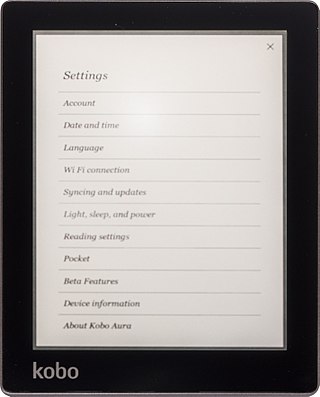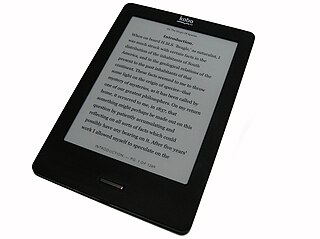Related Research Articles

E Ink is a brand of electronic paper (e-paper) display technology commercialized by the E Ink Corporation, which was co-founded in 1997 by MIT undergraduates JD Albert and Barrett Comiskey, MIT Media Lab professor Joseph Jacobson, Jerome Rubin and Russ Wilcox.

The Sony Reader (ソニー・リーダー) was a line of e-book readers manufactured by Sony. The first model was the PRS-500 released in September 2006 and was related to the earlier Sony Librie, the first commercial E Ink e-reader in 2004 using an electronic paper display developed by E Ink Corporation. The last model was the PRS-T3, after which Sony announced it would no longer release a new consumer e-reader.

An e-reader, also called an e reader or e device, is a mobile electronic device that is designed primarily for the purpose of reading digital e-books and periodicals.

Adobe Digital Editions is an e-book reader software program from Adobe. It is used for acquiring, managing, and reading e-books, digital newspapers, and other digital publications. The software supports EPUB and PDF. It implements a proprietary scheme of digital rights management (DRM) which, since the version 1.5 release in May 2008, allows document sharing among multiple devices and user authentication via an Adobe ID. Digital Editions is a successor to the Acrobat eBook Reader application.
The following is a comparison of e-book formats used to create and publish e-books.

Accessible publishing is an approach to publishing and book design whereby books and other texts are made available in alternative formats designed to aid or replace the reading process. It is particularly relevant for people who are blind, visually impaired or otherwise print-disabled.

EPUB is an e-book file format that uses the ".epub" file extension. The term is short for electronic publication and is sometimes stylized as ePUB. EPUB is supported by many e-readers, and compatible software is available for most smartphones, tablets, and computers. EPUB is a technical standard published by the International Digital Publishing Forum (IDPF). It became an official standard of the IDPF in September 2007, superseding the older Open eBook (OEB) standard.
BBeB is a proprietary eBook file format developed by Sony and Canon. Although initially designed for the Sony Librié, it is also supported by other Sony e-book readers.

An ebook, also spelled as e-book or eBook, is a book publication made available in electronic form, consisting of text, images, or both, readable on the flat-panel display of computers or other electronic devices. Although sometimes defined as "an electronic version of a printed book", some e-books exist without a printed equivalent. E-books can be read on dedicated e-reader devices, also on any computer device that features a controllable viewing screen, including desktop computers, laptops, tablets and smartphones.
The International Digital Publishing Forum (IDPF) was a trade and standards association for the digital publishing industry, set up to establish a standard for electronic book publishing. It was responsible for the EPUB standard currently used by most e-readers.

The Nook 1st Edition is the first generation of the Nook e-book reader developed by American book retailer Barnes & Noble, based on the Android platform. The device was announced in the United States in October 2009 and was released the next month. The Nook includes Wi-Fi and AT&T 3G wireless connectivity, a six-inch E Ink display, and a separate, smaller color touchscreen that serves as the primary input device. In June 2010 Barnes & Noble announced a Wi-Fi-only model of the Nook. On June 5, 2018 Barnes and Noble announced support for logging in to BN.com and adding new content to the device will end on June 29, 2018. The second-generation Nook, the Nook Simple Touch, was announced on May 25, 2011 with a June 10 release date.

The Kobo eReader is an e-reader produced by Toronto-based Kobo Inc. The company's name is an anagram of "book". The original version was released in May 2010 and was marketed as a minimalist alternative to the more expensive e-book readers available at the time. Like most e-readers, the Kobo uses an electronic ink screen. The Arc tablet series, released between 2011 and 2013, was based on LCD technology instead.

The Nook Color is a tablet computer/e-reader that was marketed by Barnes & Noble. A 7-inch (18 cm) tablet with multitouch touchscreen input, it is the first device in the Nook line to feature a full-color screen. The device is designed for viewing of books, newspapers, magazines, and children's picture books. A limited number of the children's books available for the Nook Color include interactive animations and the option to have a professional voice actor read the story. It was announced on 26 October 2010 and shipped on 16 November 2010. Nook Color became available at the introductory price of US$249. In December 2011, with the release of the Nook Tablet, it lowered to US$169. On 12 August 2012, the price lowered to US$149. On 4 November 2012, the price was further lowered to US$139. The tablet ran on Android.
Sigil is free, open-source editing software for e-books in the EPUB format.

The Kobo Touch is the third generation of the Kobo e-reader device designed by Kobo Inc. It was revealed on 23 May 2011 and was released in the U.S. on 10 June 2011 at a price of $129.99.

The Kobo Glo is the fourth generation of Kobo eReader devices designed and marketed by Kobo Inc. It was revealed on 6 September 2012 and arrived at retail 14 October 2012 with a price of $129.99 USD/CAD. It is the successor to the popular Kobo Touch was introduced alongside the Kobo Mini and Kobo Arc. The Glo was succeeded in 2015 by the higher-resolution Glo HD, with 4GB built-in storage but no microSD removable storage.

Lucifox is a discontinued free and open source add-on for the browser Mozilla Firefox that manages, downloads and displays e-books. It supports EPUB 3 and EPUB 2 formatted books without digital rights management (DRM) and retrieval of books from online book catalogues using the Open Publication Distribution System (OPDS). It is part of the Lucidor suite of free and open source e-book software made by the Swedish developer Ordbrand.

FBReader is an e-book reader for Linux, Microsoft Windows, Android, and other platforms.
References
- ↑ "Open Packaging Format (OPF) 2.0 v1.0". 2007-09-11. Archived from the original on 2009-06-04. Retrieved 2020-05-05.
- ↑ Judge, Paul (1998-11-16), "E-Books: A Library On Your Lap", BusinessWeek, archived from the original on February 8, 2000
- ↑ http://esupport.sony.com/US/perl/swu-download.pl?upd_id=3623&mdl=PRS505 Sony Reader PRS-505
- ↑ Intel Reader Archived 2012-09-10 at archive.today
- ↑ Barnes & Noble Nook
- ↑ Kobo Reader
- ↑ Audiobook and eMagazine library